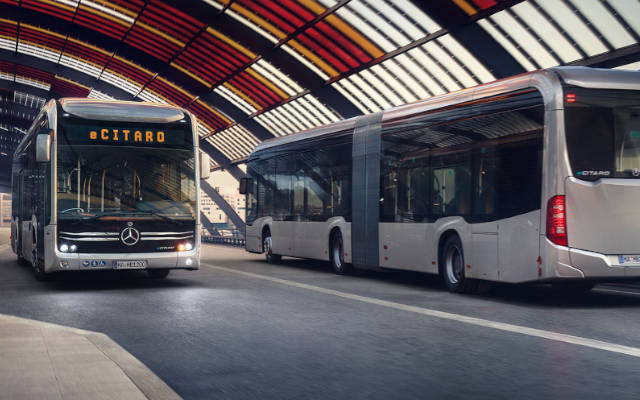Mercedes-Benz eCitaro: The Electric Bus Redefining European Public Transit

Articulated Mercedes Benz eCitaro electric buses
By EVWorld.com Si Editorial Team
In the ongoing quest to decarbonize urban centers, public transport is on the front line. Leading the charge is the Mercedes-Benz eCitaro, a bus that has rapidly become a cornerstone of zero-emission transit across Europe. Building on a legendary diesel-powered legacy, the eCitaro has evolved into a sophisticated platform offering both pure battery-electric and innovative hydrogen fuel cell configurations, providing a tailored solution for virtually any urban route.
From Diesel Legacy to Electric Pioneer
Launched in 2018, the eCitaro was born from the platform of the most successful city bus in Europe, the Citaro. This strategic decision allowed Mercedes-Benz to pair a proven, reliable vehicle architecture with a new, state-of-the-art electric drivetrain. The first models rolled off the production line in Mannheim, Germany, and were delivered to Hamburg's Hochbahn AG, marking the beginning of a new era. Since then, its adoption has been swift, with over 2,500 units produced and deployed across the continent.
Technological Evolution: Batteries, Fuel Cells, and Power
The eCitaro's journey is one of continuous technological advancement. Initially equipped with lithium-ion (NMC) batteries, the bus has seen successive battery generations significantly boost energy density and range. The latest NMC3 batteries offer up to 280 km in the solo bus. An early foray into solid-state batteries, while ambitious, highlighted the challenges of pioneering new tech after an insulation fault led to a temporary service halt for some models.
The most significant leap came in 2023 with the introduction of the eCitaro fuel cell. This model is not a hydrogen bus in the traditional sense, but a battery-electric bus featuring a Toyota-sourced hydrogen fuel cell as a range extender. The fuel cell generates electricity on the move to recharge the batteries, effectively eliminating range anxiety. This innovation pushes the solo bus's range to around 350 km and the articulated version to approximately 250 km, making it a true one-to-one replacement for diesel buses on demanding schedules.
Strategic Deployment: The Right Bus for the Right Route
The genius of the eCitaro platform lies in its two-pronged approach. Transport operators are not forced into a one-size-fits-all solution; they can create a strategic mixed fleet.
The battery-only eCitaro is the workhorse for predictable, inner-city loops where its range is sufficient and it can return to the depot for overnight charging. Opportunity charging via pantograph can further support its use on high-frequency routes.
The eCitaro fuel cell is the problem-solver, tasked with longer suburban routes, express services, and schedules with tight turnarounds that leave no time for charging. Its operational flexibility and quick hydrogen refueling (around 10 minutes) make it indispensable for achieving a 100% zero-emission fleet. Today, these hydrogen-assisted buses are already in regular passenger service in German cities like Heidelberg, Mannheim, and Stuttgart.
Manufacturing, Cost, and Deployment
The eCitaro is primarily manufactured at the historic Mercedes-Benz plant in Mannheim, Germany, with additional production in Ligny-en-Barrois, France. While the initial investment is significant—a battery model can cost around €700,000—the expense is often mitigated by government subsidies aimed at cleaning up city air. The bus has proven its success with major orders from transport authorities in Germany, Switzerland, France, Italy, Poland, and Sweden, becoming a familiar sight in dozens of European cities.
Original Backlink
Views: 113
Articles featured here are generated by supervised Synthetic Intelligence (AKA "Artificial Intelligence").
